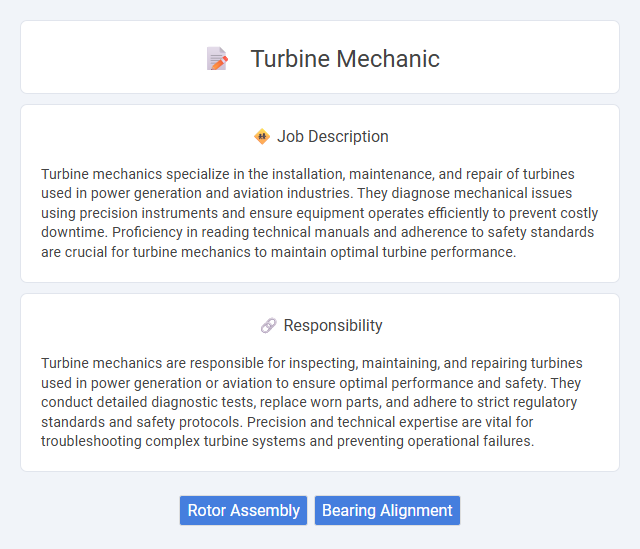
Turbine mechanics specialize in the installation, maintenance, and repair of turbines used in power generation and aviation industries. They diagnose mechanical issues using precision instruments and ensure equipment operates efficiently to prevent costly downtime. Proficiency in reading technical manuals and adherence to safety standards are crucial for turbine mechanics to maintain optimal turbine performance.
Individuals with strong mechanical skills and physical stamina are likely to be well-suited for a turbine mechanic job, given the demanding nature of the work that often involves lifting heavy parts and working in confined spaces. Candidates who demonstrate attention to detail and the ability to troubleshoot complex systems may have a higher probability of success in maintaining and repairing turbines effectively. Those with respiratory issues or limited mobility might find this occupation challenging, as it typically requires exposure to varied environments, including high noise levels and outdoor sites.
Qualification
Turbine mechanics require a high school diploma or GED, with many employers favoring completion of a technical training program in turbine repair or mechanical technology. Strong knowledge of mechanical systems, hydraulics, and electrical components is essential, along with proficiency in using diagnostic tools and equipment. Certification from organizations like the National Institute for Certification in Engineering Technologies (NICET) enhances job prospects and validates expertise in maintaining and repairing turbines.
Responsibility
Turbine mechanics are responsible for inspecting, maintaining, and repairing turbines used in power generation or aviation to ensure optimal performance and safety. They conduct detailed diagnostic tests, replace worn parts, and adhere to strict regulatory standards and safety protocols. Precision and technical expertise are vital for troubleshooting complex turbine systems and preventing operational failures.
Benefit
Turbine mechanics likely enjoy numerous benefits, including competitive salaries and opportunities for overtime pay due to the specialized nature of their work. Job stability and career growth are probable, especially in industries such as power generation and aviation where turbine maintenance is critical. Health insurance, retirement plans, and continuous training programs frequently enhance the overall compensation package for turbine mechanics.
Challenge
Turbine mechanic jobs likely present significant challenges due to the complexity and precision required to maintain and repair turbine engines. The probability of encountering intricate mechanical failures or requiring detailed diagnostic skills seems high, demanding strong technical expertise and problem-solving abilities. Working in this role may also involve managing safety risks and adhering to strict industry standards, further increasing the job's difficulty and responsibility.
Career Advancement
Turbine mechanics specializing in gas, steam, or wind turbine maintenance benefit from diverse advancement opportunities through certifications such as the Certified Turbine Maintenance Technician (CTMT) and gaining expertise in computerized diagnostic systems. Progression often leads to supervisory roles, project management, or specialized positions in renewable energy sectors, reflecting industry trends toward sustainable power sources. Continuous professional development and hands-on experience with advanced turbine technologies significantly enhance career growth prospects in this high-demand field.
Key Terms
Rotor Assembly
Turbine mechanics specialize in the maintenance and repair of rotor assemblies, which are critical for the efficient operation of steam, gas, and hydroelectric turbines. Precise alignment, balancing, and inspection of rotor blades and shafts ensure optimal performance and prevent mechanical failures. Expertise in diagnosing wear, corrosion, and vibration issues within the rotor assembly directly impacts turbine reliability and energy output.
Bearing Alignment
Turbine mechanics specialize in the precise bearing alignment crucial for optimal turbine performance and longevity. Misaligned bearings can cause excessive vibration, premature wear, and costly downtime, making accurate measurement and adjustment essential. Utilizing laser alignment tools and micrometers, these experts ensure that turbine shafts maintain proper alignment within manufacturer specifications to enhance efficiency and prevent mechanical failures.
 kuljobs.com
kuljobs.com